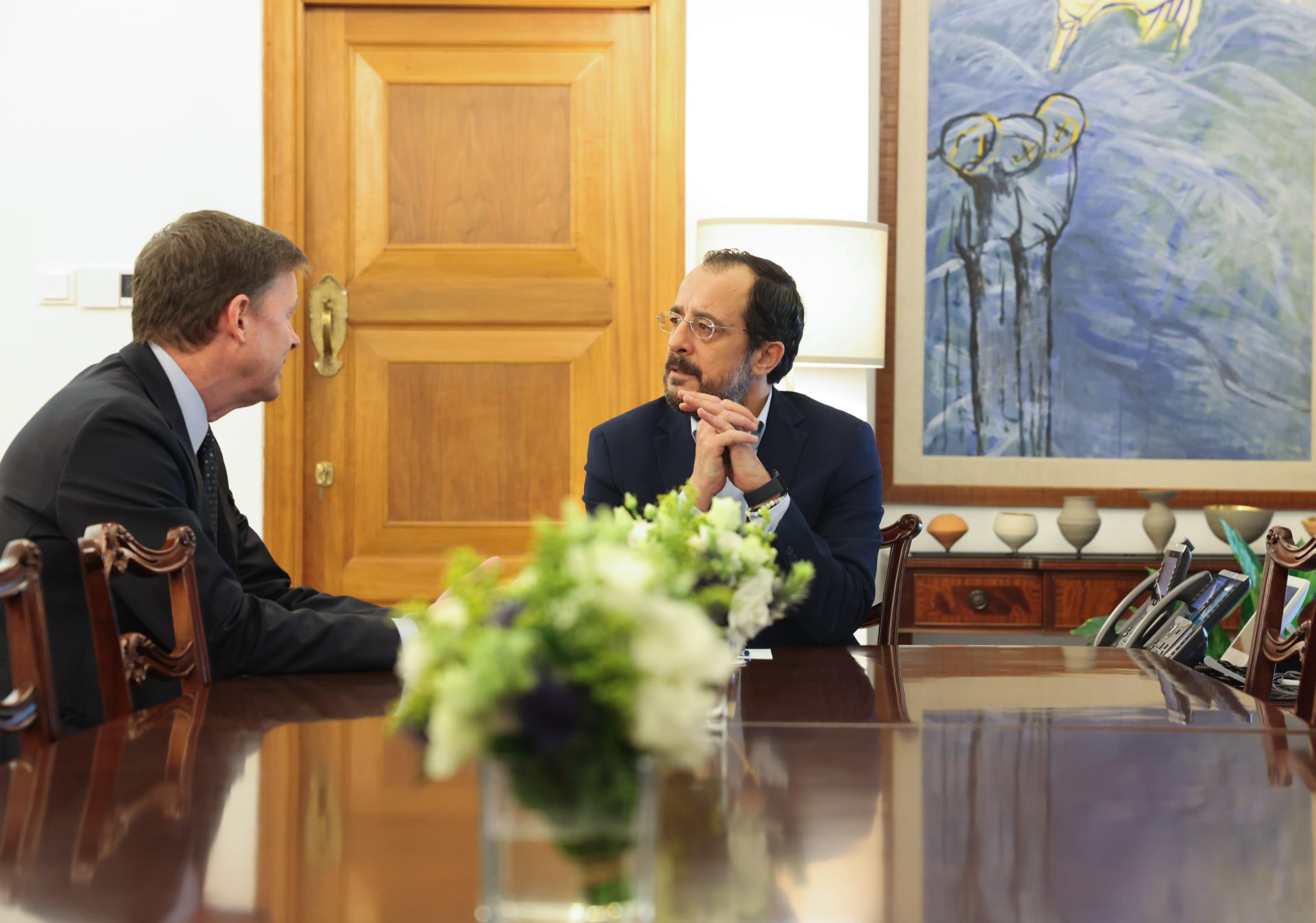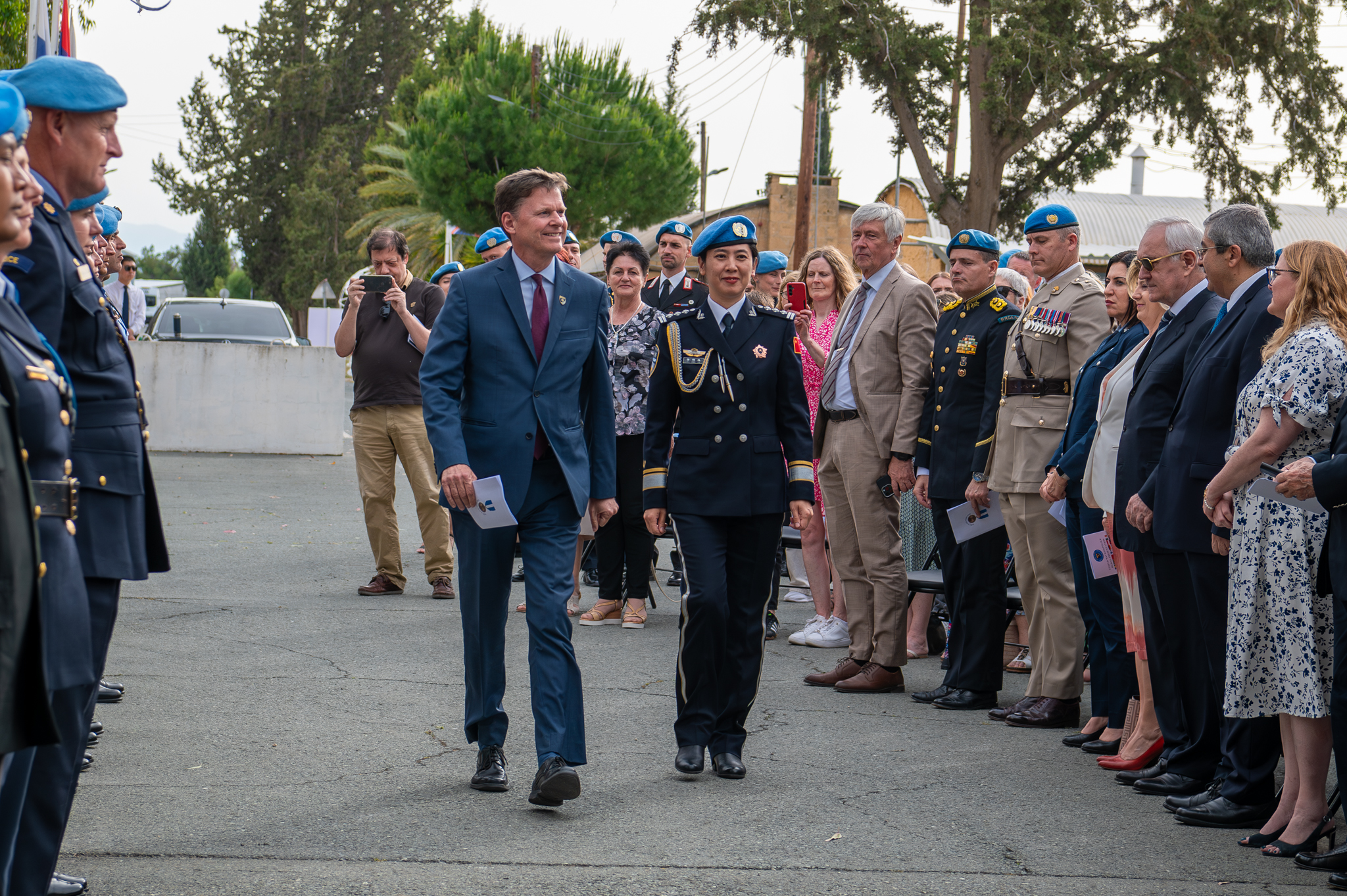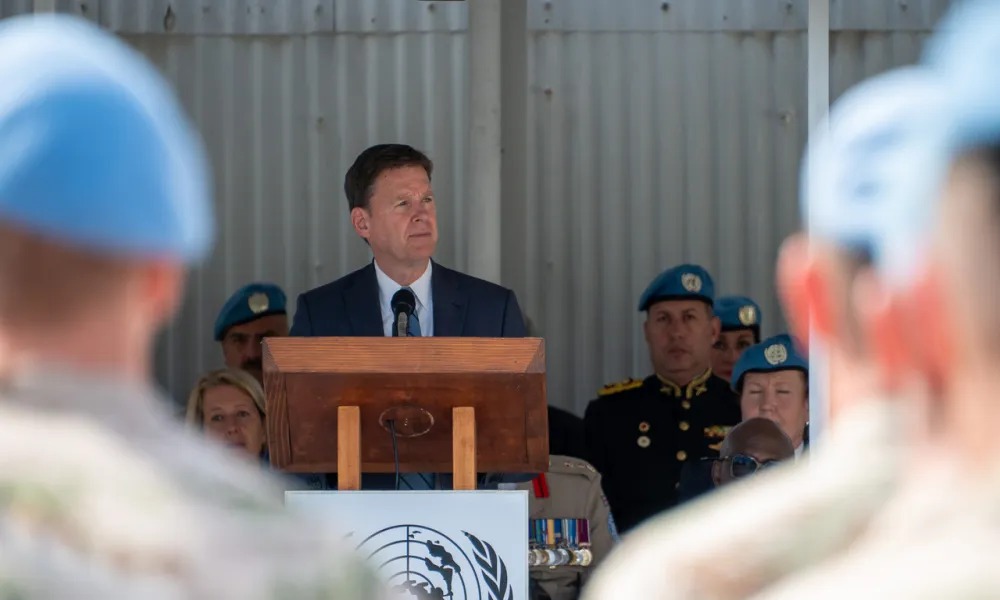Colin Stewart is the latest in a long line of UN officials who leave Cyprus having achieved only one of two stated goals: keeping the peace, and building conditions for a lasting settlement.
On the peacekeeping mission, blood has not been shed between the two opposing forces during his tenure.
On the political front, however, eight long years after the failure of Crans-Montana, there is no peace process to speak of. Only an effort to keep the sides engaged and talking through the ‘5+1’ broader format.
“The four years I’ve been here, there’s been no process. We’re not even talking about what that process should look like,” said Stewart.
If the Cyprus problem were a big mountain to climb, “we’re not even at the foot of the mountain, we’re several miles away,” he added.
Even within the high-level talks on low-level confidence-building measures, the issues appear seemingly insurmountable, raising the question as to their purpose.
“I don't know what impact we can say confidence-building measures have on confidence. But what they do is keep the wheels greased for dialogue. Without meetings you've got nothing, so engaging the parties, getting them used to dealing with each other is part of the process,” said Stewart.
In an interview with Politis, the outgoing UN Special Representative gives a frank assessment of the conflict and his near four-year tenure on the island.
One-sided narratives on both sides
“I think the Cyprus problem is solvable. The obstacle is this unwillingness to compromise (which) stems from these unchallenged narratives that exist on either side without any intersection in these echo chambers.”
“I see it every day. Every time I speak to officials on the one side I get this diatribe about all the terrible things the other side has done.”
The UN official said both sides bring “a sort of historical baggage” to any discussion on current events.
“They don't realize how one-sided their narrative is because they don't acknowledge another reality.”
Stewart is aware that his comments will not be accepted by all, but notes that accusations of bias are par for the course in the UN.
“When we issue Secretary-General's reports both sides say that we're absolutely biased. And the reason they say that is because they're so convinced that they're right, that if the UN were impartial, we would obviously see it the way they do… And the fact that both sides look at it this way, I think, illustrates the point of the one-sidedness.”
Despite the challenges, Stewart insists UN Secretary-General Antonio Guterres remains fully invested in Cyprus, meeting numerous times with the leaders and guarantor powers. The purpose is to build some momentum and goodwill that could eventually lead to a discussion on a settlement. But it’s not within Guterres’ remit to force the parties to anywhere, he noted.
“You can lead a horse to water, but you can't make it drink. If the leaders themselves are not willing to sit down and solve the Cyprus issue, there's very little the UN can do. And that's why we've been here 61 years.”
On the peace process itself, Stewart says the immediate problem after Crans-Montana was convincing the Turkish Cypriots to show interest in any kind of talks.
“They basically came out of 2017 and said, ‘that's it, we're not going to do this again’.”
Since the election of Ersin Tatar, the positions of the parties have been very far apart. They don’t even agree on the basis for any talks, said Stewart. The fact that the sides are talking again, albeit not about a settlement, is a positive step forward, he adds.

Incredible distrust and a reluctance to compromise
Stewart acknowledges there are a lot of forces arrayed against a solution and the effort to create conditions that would bring the parties to the table can feel like “pushing uphill”. But in his mind, the main obstacle is “institutional distrust”.
The leaders have a hard time agreeing on even the smaller items on the agenda, according to the UN official.
“The leaders on both sides are very hesitant to make any concessions, they're happy to go into negotiations to gain something and I've seen this on many different levels, but they're very hesitant to concede anything and it's because of this incredible distrust that exists. Not so much amongst the people, but amongst the officials of the two sides, the bureaucrats, the political parties, and so forth.”
He considers this distrust to be founded in these “echo chambers of one-sided narratives” that make the concept of compromise seem unfathomable.
“This is the problem we see in Cyprus. There’s this unwillingness to compromise because the narratives are uncompromising. Because the historic narrative about grievance and loss and victimhood are very one-sided,” said Stewart.
“They've created this idea that we're absolutely right and you're absolutely wrong so how could we possibly give in on anything.”
This apparent mindset can be seen even on the minor issues discussed between the sides.
“It’s a microcosm of the whole Cyprus issue. This unwillingness to compromise is the biggest obstacle that we can see to finding a solution. There's no such thing as a negotiated free-will solution where both sides don't compromise.”
Distrust permeates society
The UN official argues that distrust fuelled by one-sided narratives permeates across society. He notes that the Security Council has called upon both sides to review their school textbooks because some of the language used “perpetuates this feeling of ‘us versus them’ and the intolerance and animosity towards the other side”.
He also points to the media as “purveyors of these one-sided narratives that all evil comes from the other side, and we’re not doing anything wrong”. Stewart accepts there are good reasons why people feel aggrieved.
“Certainly, there have been injustices and people have suffered. But the point is that has happened on both sides. And if you don't recognize the legitimate suffering of the other side, then it's very hard to have a reasonable conversation.”
Asked how the issue of distrust could be addressed, the Special Representative referred to the concept of reconcilation.
“There needs to be an effort to have more dialogue between the sides, at a public level, in a way so that people can actually hear what those on the other side are thinking.”
The more people understand the perspective of the other, the more understanding there is of the disagreements at play.
“I think there's a need for some kind of public process, some kind of truth-telling or public interaction.”

TV soap operas
At the micro-level, the UN supports reconciliation work in Cyprus that sees people who’ve never had contact with those from the other side come together. “There's this magical moment that happens when they realise, oh, we're actually the same. We have the same interests and that sort of thing.”
The UN supported bicommunal activities involving 5,000 people in the last six months.
“That's not insignificant, but it doesn't really move the needle at the broader level, and it certainly doesn't reach the people who are hardline entrenched into their narratives.”
He adds: “I would love to see some kind of television programme that was a sitcom or soap opera of lives on the two sides just to increase people's exposure to the reality. I'm not even talking about debating ideas, but just to have a better sense of reality.”
On the question of growing apathy towards the division, Stewart argues that younger generations don’t carry the baggage of their parents and grandparents, and so probably don't get up in the morning thinking about the Cyprus issue. However, the UN’s experience has been that if you reach out to young people and expose them to ideas and people from the other side, they're actually very open to it.
However, he issues a stark warning – one of the tragedies of Cyprus is that over time, the gulf between the two sides has grown considerably, reducing the chances for reunificaiton. Few people speak both languages anymore, while commercial interaction is minimal.
“The north is dependent economically and politically on Türkiye and that dependence grows day by day. The more that happens, the less the conditions will exist for some kind of solution involving reunification.”
Without peacekeeping, there would be conflict
On the peacekeeping mission and to those who argue that UN presence on the island has ultimately served to perpetuate the conflict by maintaining the status quo, he notes that keeping the peace is preferable to loss of life. The UN is playing an “indispensable role” in this regard, he says, adding: “There isn’t really a scenario where you could talk about pulling the UN out safely.”
“The UN is actually very busy preventing conflict on a daily basis,” said Stewart. There are dozens of incidents every day in the buffer zone, and each one has the potential to escalate into political or military tensions.
“If the UN were to leave, the distrust is so high that each side would fear the other side was going to take advantage, fill the vacuum, move forward and seize something in the buffer zone.”
This would lead to immediate conflict, not because either side wants a fight but because “each side would feel compelled to take preventive action and that would precipitate them into head-to-head conflict”.

Lessons from Pyla and the zero-sum game
In August 2023, UN forces were assaulted trying to prevent the Turkish Cypriot side from building a road in the buffer zone in Pyla. This ultimately led to talks between the UN and both sides, resulting in a “win-win” agreement on how to move forward in the area. The agreement has never been implemented.
Asked why, Stewart once again argues that it all comes down to distrust.
He notes that when it became obvious the Turkish Cypriot side was planning to unilaterally build a road in the buffer zone, the UN realised they could not stop it, and so tried to find ways to salvage the situation.
“As a peacekeeping mission, we're not equipped to stop an army. We didn't think we would be able to ultimately physically prevent them. And condemning them after the fact wasn't going to be very effective.”
So, the UN approached the two sides to try and find a compromise agreement that would avoid unilateral actions. The Turkish Cypriots were open to a discusison. Stewart approached the Greek Cypriot side proposing endorsement of the building of the road in exchange for certain developments on the plateau above Pyla, which could take on a truly bicommunal nature.
“At first, as is absolutely classic, the Greek Cypriot reaction was, absolutely no way, over our dead bodies… they refused to even discuss any type of compromise. And that was their position until about the day before the machinery started rolling in the north. Then they had a change of heart,” says Stewart.
They agreed to talk, but it was too late. Things had already been set in motion and there was no way to reverse the decision.
What happened next was “unfortunate” and not anticipated, “but the Turkish side made a strategic error of attacking the peacekeepers”. They were condemned by the international community and withdrew. The UN received a message that they were ready to talk.
The following period was “probably one of the most positive experiences of my time here,” says Stewart. Discussions began with both sides committed to making a deal. They quickly found common ground. “It was really a very rewarding period.”
So, what went wrong?
“Again, it is quite classic here, when one side crows victory after such a negotiation which was very clearly a win-win, but to my horror, Cypriots don't like to admit to win-win. So both sides described it as if they had won and prevailed over the other side. And I would say that was particularly the message from the Greek Cypriot side.”
“Of course, if you say those things publicly, then the other side starts to become suspicious that somehow they've been duped.”
Added to that, there was a lack of full consultation on the Turkish side regarding the agreement, resulting in certain quarters there raising objections. Ultimately, the whole thing fell apart and remains stuck two years later.
“Ultimately, it’s this distrust, this unwillingness to be seen to be conceding or compromising. It's the same problem we have on everything, crossing points or solar projects. They're microcosms of the Cyprus issue itself.”
Even when there are obvious benefits to cooperation, the obstacles are so great in terms of distrust that solving these problems is just as complicated as solving the whole Cyprus issue.
“And there's times when I've thought to myself, well, why don't we just solve the Cyprus problem and then all these other problems will go away. It would take the same amount of effort.”
